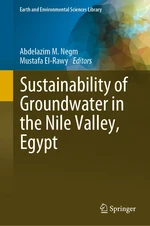Groundwater is the worldâs largest source of fresh water, but its safe and sustainable exploitation remains a challenge. Egypt's Nile Valley aquifer is the most important renewable aquifer, accounting for approximately 85% of total groundwater use in Egypt. Egypt's long-term development and socioeconomic growth in the Nile Valley depends on this groundwater. Concerns about groundwater assessment, quality, management, and sustainability frame the current status of Nile Valley groundwater supplies. Proper knowledge of the current state of the groundwater quantity and quality in the Nile Valley is vital for the development and management of groundwater resources in Egypt. Due to Egypt's water scarcity, the projected decline in Nile River flow due to climate change, and the development of numerous Nile River basin projects, the situation is critical, and the consequences might be severe. Furthermore, Egypt's growing population puts significant strain on groundwater, which is the second most significant freshwater supply next to the surface water supply coming from the Nile River as Egyptâs share. Several books on the various aspects of Egypt's water resources have been published, but there is insufficient recent information on groundwater in the Nile Valley aquifer, which is essential for Egyptian populations for domestic and irrigation purposes. As a result, this book on the groundwater in the Nile Valley aquifer emerges to complete the picture of Egyptâs water resources as a good example of arid country located in MENA regions with many arid countries. Consequently, the lessons learned from this book could be beneficial to other countries in MENA regions, particularly those in North Africa.
Price history
Oct 2, 2022
€154.13

